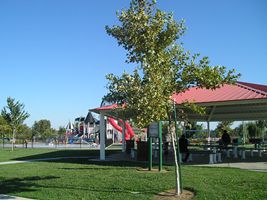On Jan. 10-14, 2013 Karunya University will be hosting the International Regional Scientific Meeting, which focuses on land-use, land-cover, and water resources in South Asia.
The EPA has decided to issue $380,000 in grants to New Jersey and New York for projects that will help prevent pollution across the two states.
With the Apps for Vehicles Challenge, the public is encouraged to submit ideas for apps that would help drivers reach the next level of fuel efficiency.
The ice sheet in West Antarctica is melting faster than expected, causing oceanographers to find ways to improve predictions of future changes in ice sheet mass.
According to research, smart water networks can save utilities around the world approximately $12.5 billion a year.
EIA has released its Annual Energy Outlook 2013 (AEO2013) Reference case today. The report predicts that the growth in total energy production will exceed the growth of total energy consumption in the U.S. through the year 2040.
According to researchers, coastal fog in California contains elevated mercury levels, which may be the result of upwelling deep ocean water along the coasts. Upwelling processes bring mercury to the surface of the water, where it enters the atmosphere and is absorbed by fog.
Petroleum Company of Trinidad & Tobago, Ltd. has teamed with GE to use their water treatment technologies in order to help their refinery at Pointe-a-Pierre produce 3.5 million imperial gallons of water each day.
Recent observations from satellites have shown that the smoke from Arctic wildfires is drifting over the Greenland ice sheet, settling on the ice as soot and making it more likely to melt under the sun.
According to a new analysis by NREL and Berkeley lad, downward pricing for solar energy is expected to continue with soft costs making 40 to 50 percent of residential and commercial PV prices.
In a new study, researchers have found an association between fine particulate matter reductions and improved life expectancy in 545 counties across the U.S.
The EPA has awards $15,000 grants to 45 college teams, a total of $675,000, in phase I of its People, Prosperity and the Planet annual student design competition, which is geared toward sustainable technology.
The Smithsonian's Anacostia Community Museum presents its groundbreaking exhibition "Reclaiming the Edge: Urban Waterways and Civic Engagement" on view through Sept. 15, 2013, which examines the consequences of the abuse of waterways worldwide and the efforts by communities to restore them.
With a new method for estimating greenhouse gases, researchers have found that the levels of nitrous oxide, a potent greenhouse gas, are much higher than previous predictions.
The world’s only artificial watershed inside the Biosphere 2 at the University of Arizona receives its first rain, giving researchers the first opportunity to study how water, soil, plants, and microbes interact in a realistic setting; this rare chance could help improve future global climate models.
GM’s Components Holdings LLC plant in Lockport, N.Y. has become the automaker’s 103rd facility to obtain landfill-free status, putting the company one step closer to achieving its goal of having 125 landfill-free sites by 2020.
According to a new study, pesticides currently used in treatment processes for tap water could be to blame for food allergies that afflict 15 million Americans.
USDA scientists are helping out military personnel deployed overseas by outfitting soldiers with clothing that repels or kills disease-transmitting mosquitos and sand flies.

Since the establishment of a state program that donates money to cities and counties for parks when affordable housing communities are built, California has received more than $20 million in funds.
On Dec.11, a new group that hopes to protect and improve water quality and flows of North and South Llano Rivers will be holding a meeting. Local residents are encouraged to attend.